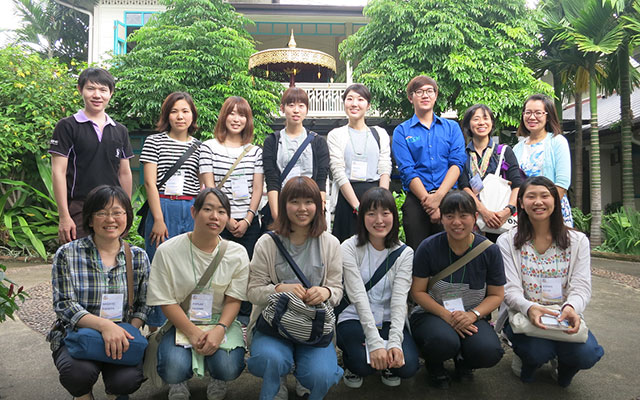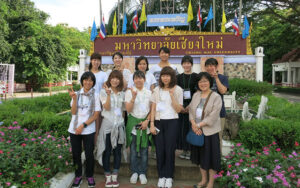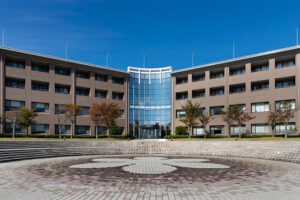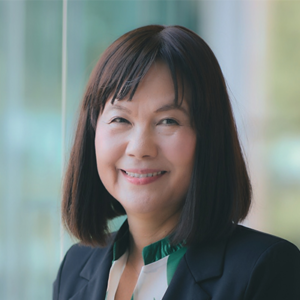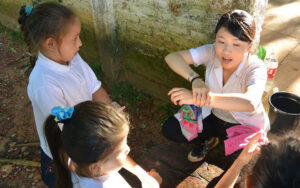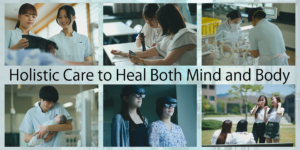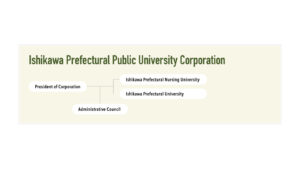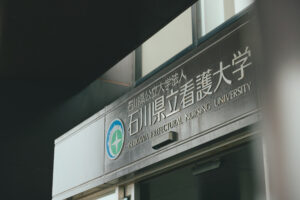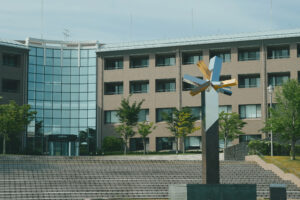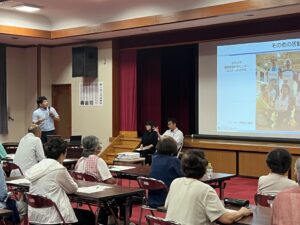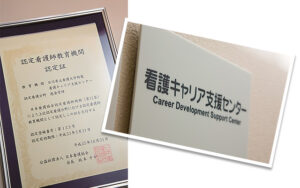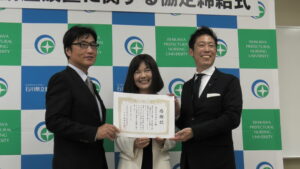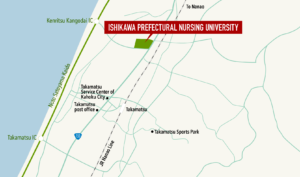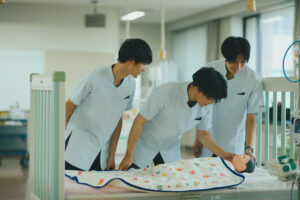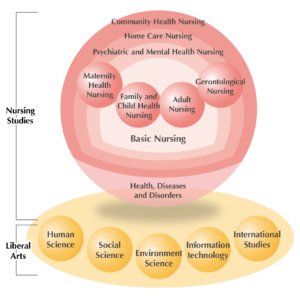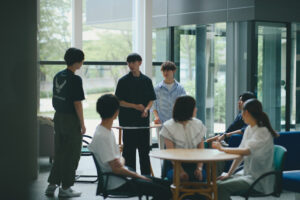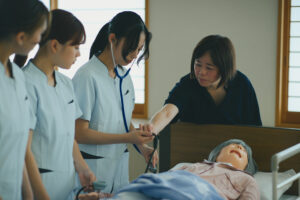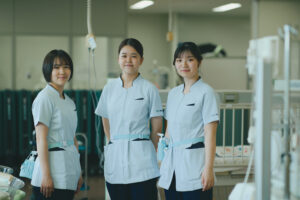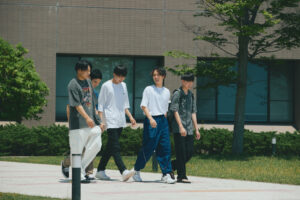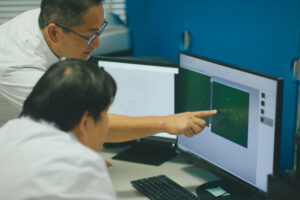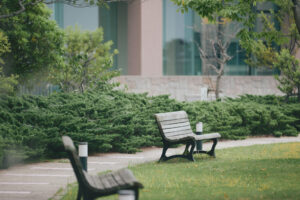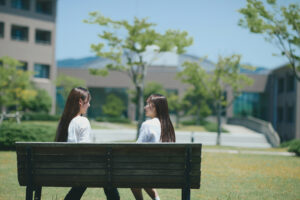Chiang Mai University Training Program, Thailand
FY2016 Program for Promoting Inter-University Collaborative Education
Human Healthcare Personnel Training Project: Studying Local Healthcare Systems Abroad
Thailand Training Report
Faculty of Nursing, Chiang Mai University, Chiang Mai, Thailand
Our school has been an active participant in the Human Healthcare Personnel Training Project, which is a part of the Ishikawa University Glocal Problem-Solving Training Project within the Program for Promoting Inter-University Collaborative Education. As part of this effort, we held a 16-day nursing training program at the Faculty of Nursing, Chiang Mai University, Thailand, from August 27 to September 11, 2016.

The goal of this training was to understand the healthcare system in a country with a different political system, culture, and economy. Through learning about the livelihoods of people in the community and the measures taken to tackle health challenges, we aimed to help students obtain a broader perspective and become “glocal” professionals who are capable of supporting people’s health in various parts of the world. Our specific goal for this program was to enable the students participating to learn about the healthcare system in another Asian country, and bring home new perspectives on various issues such as decreasing birthrates and aging populations. We had many valuable experiences in this training program, provided by the Faculty of Nursing at Chiang Mai University.
Participants
From Ishikawa Prefectural Nursing University: 2 second-year students, 4 third-year students, 1 fourth-year student, 2 teachers
From Kanazawa University: 2 third-year students
Total: 11 participants
Overview of Training
1. Lecture
Ceremony with the vice dean awarding nursing training program certificates
- Nursing education in Thailand
- The role of the healthcare system and public health nurses in Thailand
- Trauma care
- Home nursing in the Chiang Mai region
- Nursing the elderly in Thailand
- HIV/AIDS prevention during childhood and adolescence
- Thailand’s traditional approach to complementary medicine and its wisdom
- Thailand’s approach for preventing infectious diseases

2. Home Nursing and Practice


- Visiting the Chiang Mai University Hospital and local hospitals
(emergency room and surgery ward) - Introduction to the local home nursing system and a tour of a practice site
(understanding the realities of home nursing) - Visiting a healthcare center and community care unit
- Visiting a salon for the elderly
- Visiting and experiencing Thailand’s massage school
- Visiting the Thai Traditional Complementary Medicine Center of Chiang Mai University
- Exchanging ideas with members of the Child Protection Steering Committee and Adolescent Sex Issues Management Committee at the Rua Nua regional community center
- Taking part in skill practice: intubation for nasal tube feeding
- Summary presentation on the training (in English), followed by a question-and-answer session
3. Cultural Exchange
New students are taken on a welcome hike. The group with fine clothing in the front consists of students already enrolled at the university, and new students follow them on a 14-kilometer hike to the top of a mountain.
- Introducing home countries, regions, and universities, by students of Chiang Mai University and the Japanese schools represented (University of the Ryukyus Faculty of Medicine, Kanazawa University, and Ishikawa Prefectural Nursing University)
- Performances by Chiang Mai University’s traditional dance club, the University of the Ryukyus’ ethnic dance group, Kanazawa University, and Ishikawa Prefectural Nursing University’s calligraphy class
- Touring the town of Chiang Mai and its surroundings (guided by students from the Chiang Mai University Faculty of Nursing)
- Joining the welcome hike for new students entering Chiang Mai University

Lessons from the Training (Excerpts)
(IWASA Shiori, second-year student)
I learned about Thailand’s system of medicine, healthcare, and nursing, and developed a deeper understanding of these through this training. In addition, when comparing the situation with that in Japan, I was able to incorporate my experience of going to South Korea during my first year of study. I strongly believe that it is important to actually experience things rather than just hearing about them. My views on Thailand changed completely from before our visit. There are many things you simply cannot know unless you actually go to a place. I would like to tell current and future nursing students in Japan that you can miss out on chances to learn, if you feel as though just hearing about things is enough to provide a sufficient understanding. It is important to proactively pursue opportunities that can be experienced only in the present. I believe that what one learns depends on whether one has studied the basics beforehand. I intend to hold onto this desire to experience things for myself.
(WAKASA Atsumi, third-year student)
The program that had the most lasting impression on me was the one on trauma care. The second most common reason for death in Thailand is accidents, and I learned that trauma care is very important in this country. Many people travel on motorcycles in Thailand, often without wearing helmets and with as many as three people riding together on a single motorcycle. In addition, vehicles follow each other at very close distances, which seems to be another reason for why there are so many accidents. I have heard that when Thai people have accidents, they say that they were unlucky rather than accepting that they drove poorly; I feel that such attitudes, perhaps derived from a Buddhist worldview, are one reason why the large number of accidents does not decline. We learned that ambulances typically arrives at scenes of accidents within ten minutes; however, this is slow compared to ambulance arrival times in Japan because of the longer travel distance from the location of the ambulance to the scene of the accident, as well as heavy traffic congestion. In addition, I learned that the local government does not have its own ambulance service, which is another reason for the slow response.
(NITTA Akari, third-year student)
The program that left the most lasting impression on me was the tour of the club for the elderly. This club was founded with five members but currently has 2,000. I wondered how they were able to expand to such a large size. I learned that the primary method was word of mouth, as participants of the elderly club talked about their activities with other people in the region. Nothing in particular was done to attract more participants. I think that despite word-of-mouth publicity, the number of participants won’t increase unless people are willing to participate. This led me to feel that the elderly in Thailand have a strong interest in health. The participants are highly health-conscious, and the club is creative in devising ways to provide its members with fun experiences. Its activities include lectures on chronic diseases, traditional Thai dancing, lectures on law by lawyers, and health check-ups by university medical faculty, I hope to adopt some of these Ideas in the health course I teach once a month. I felt that the motto of helping participants was similar in Thailand to what I have heard in Japan.
(YAMAMOTO Natsumi, third-year student)
Throughout this training, we enjoyed communicating with local students from our generation. I learned firsthand that one does not have to be fluent in English to communicate. At first, I wasn’t able to start conversations, because I was too nervous and afraid to try. I improved my English language skills by being in an environment where only English was spoken, and now I’m no longer afraid to try to communicate in English. I would like to further improve my English language skills so that I can communicate more freely. In addition, I think that I should learn more about Japan so that I can describe my country better to people in Thailand. Seeing students at Chiang Mai University enjoying their student life and talking with them gave me a strong sense that I will enjoy studying nursing. I am really grateful to have been able to experience a large number of things, during my 16 days in Thailand, that would have been impossible in Japan. I hope to remember this experience and make it a source of strength.
Training Report (KANAYA and SHIMIZU, Supervising Teachers)
By meeting the teachers and staff of the Faculty of Nursing at Chiang Mai University and conducting a training program, we were able to arrange a variety of lectures and visits that matched the training objectives. The students thought about the differences and similarities between Japan and Thailand as they participated in this cross-cultural training program. They learned about the importance of nursing within local communities. They were able to experience the basics and key concepts of nursing once again by coming into contact with not only modern medicine but also traditional medicine and current practices in mountainous areas.
Nursing education in Thailand was imported directly from the West; hence, some aspects of it are different from programs in Japan, even though both countries are in Asia. However, we shared with each other our understandings of the essence of nursing and our sense of the role of human relationships in nursing. We found that in Thailand, the ideas of caring for the family and of person-to-person nursing that do not depend on modern medical devices — something that Japan used to emphasize but nowadays tends to forget — are still present. The local medical system is not as advanced as it is in Japan, and as Thailand shifts toward a lower birthrate and an aging society, it increasingly faces many of the health issues that Japan has already encountered. We believe that it was a good experience for the students to learn about social and health issues in Thailand, and to draw comparisons with the current situation in Japan regarding such issues and how Japan used to respond to them. Overall, the training program gave the students a chance to broaden their horizons regarding health issues in different countries, and to reflect on their views regarding nursing and their own futures.
